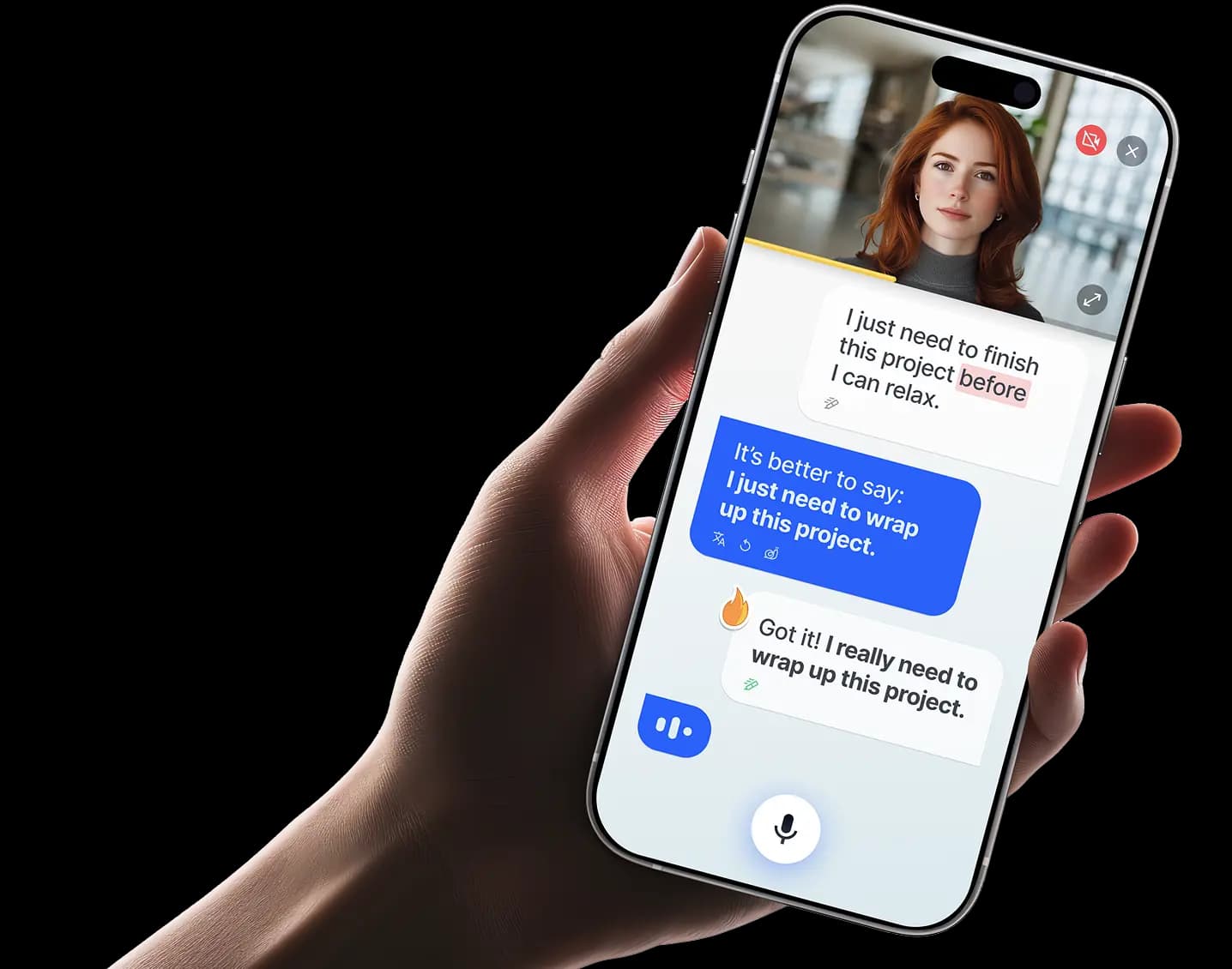Speak With Impact and Learn Key Phrases in English for Marketing

Your competitor just landed the million-dollar account with a pitch that had executives nodding from minute one. Meanwhile, you're struggling to explain why conversion rates dropped without sounding robotic.
Here's the truth: in marketing, how you say it matters as much as what you say. The difference between "Our metrics show positive engagement" and "We're crushing engagement targets—up 40% this quarter" is often the difference between budget approval and watching competitors win your campaigns.
Marketing professionals who get promoted don't just have great ideas—they communicate those ideas with confidence and precision. They speak the language of results:
Weak: "We think this campaign might improve numbers"
Powerful: "This campaign delivers 25% more qualified leads within 60 days"
Weak: "The data shows interesting trends"
Powerful: "These insights reveal a $500K revenue opportunity we can capture this quarter"
Loora AI is perfectly positioned to get you fluent in ‘marketing’, helping you build up your confidence with daily practice on the topics that you need most. Think transferable language skills that you can use from day 0.
Use this guide to work on high-impact English skills that separate marketing leaders from followers: persuasive presentations, compelling copy, and confident communication that closes deals and advances careers.
Key takeaways
The following are the key takeaways for this guide:
- An analysis of English proficiency as a career catalyst
- A framework for overcoming industry-specific language challenges
- An overview of essential marketing terminology and application strategies
The role of English in marketing
English dominates global marketing communications. Digital marketing campaign strategies are presented in English; even advertising project meetings happen in English.
This reality creates a simple equation: English-fluent marketers access opportunities others can't.
Multinational companies pay higher salaries to marketers who can navigate English-speaking markets. It's these professionals who will lead international marketing campaigns, manage global teams, and represent brands at worldwide events. At that level, each successful English presentation leads to bigger budgets and better opportunities.
Challenges in attaining English fluency for marketing professionals
Non-native English speakers in marketing get stuck between formal grammar rules and the casual, confident tone that actually closes deals.
You can sell ice to penguins in your native language, but switch to English and suddenly you're reading bullet points off slides. It's a frustrating contradiction you’d want to leave behind.
Yet, this is a problem that generic English courses can't solve because learning general corporate English is a lot different from articulating brand positioning strategies. Loora AI helps overcome this barrier by creating personalized learning paths for you that help you incorporate key marketing terms like "market research”, “product launch", and "market share” into everyday conversation.
Fear of mistakes creates the next barrier to learning. Marketing demands precision because it's a field where words directly impact revenue. A misplaced modifier in an email campaign can cost thousands. This pressure makes professionals overcautious, sticking to the safe, boring language that lacks the dynamic, persuasive punch marketing requires. Loora AI can help you communicate precisely and effectively through practice.
Then, we come to the matter of cost: Quality business English programs charge premium rates, and private tutors with marketing expertise command even higher fees. Exorbitant as it is, many professionals can't justify these expenses, especially when companies rarely budget for language training.
The combination creates a frustrating cycle, pushing professionals who recognize the importance of English fluency to seek innovative solutions like Loora. Loora is cost-effective and available 24/7 for all your English language needs.
Key marketing vocabulary all professionals need to know
Below are some useful marketing sentences, phrases, and words, complete with core categories and usage examples:
Digital marketing fundamentals
These are words that form the backbone of modern marketing online:
Search Engine Optimization (SEO)
Search Engine Optimization (SEO)describes the art of making the brand website appear first when customers search for solutions.
Usage example
- "Our SEO strategy increased organic traffic by 40% this quarter."
- "We're losing SEO rankings to competitors who share content in online communities more frequently."
Pay-Per-Click (PPC)
This word represents the act of buying website visits through targeted ads rather than waiting for organic traffic.
Usage example
- "Let's allocate 30% of the budget to PPC campaigns for immediate visibility."
- "PPC costs are rising, so we need to optimize ad copy and targeting."
Conversion rate
The phrase refers to the percentage of website visitors who take the desired actions, like purchasing or subscribing.
Usage example
- "The new landing page boosted our conversion rate from 2% to 5%."
- "Mobile conversion rates lag behind desktop, indicating a user experience problem."
Cost Per Acquisition (CPA)
This refers to the total amount spent to gain one new customer through marketing efforts.
Usage example
- "Facebook ads have a CPA of $25, while Google ads cost us $40 per customer."
- "If our CPA exceeds customer lifetime value, we're losing money on every sale."
Analytics and measurement
These marketing terms are used to prove marketing's business impact:
Return on Investment (ROI)
This is the profit generated from marketing spending, expressed as a percentage of initial investment.
Usage example
- "The email campaign delivered 300% ROI within three months."
- "Leadership wants to see positive ROI before approving additional marketing spend."
Customer Lifetime Value (CLV)
The phrase refers to the total revenue one customer generates throughout their relationship with a brand.
Usage example
- "Our premium customers have a CLV of $2,000 compared to $500 for basic users.
- "Improving customer retention by 5% could increase CLV by 25%."
Attribution modeling
This is the method for assigning credit to different marketing touchpoints in a customer's journey.
Usage example
- "First-click attribution shows social media drives initial awareness better than expected."
- "Without proper attribution modeling, we can't determine which channels deserve more budget."
Key Performance Indicators (KPIs)
These are specific metrics that measure progress toward marketing objectives and business goals.
Usage example
- "Our primary KPIs this quarter are lead generation and brand awareness metrics."
- "The dashboard tracks five critical KPIs that leadership reviews weekly."
Customer engagement
These marketing terms describe audience behavior to enable smarter campaign decisions and stronger brand loyalty:
Target audience
The phrase refers to the specific group of consumers most likely to purchase a brand’s products or services.
Usage example
- "Our target audience consists of tech professionals aged 25-40 with disposable income."
- "We're expanding beyond our core target audience to capture younger demographics."
Customer journey
This is the complete sequence of interactions potential customers have with a brand before purchasing.
Usage example
- "The customer journey analysis revealed a drop-off point after the demo request."
- "Mapping the customer journey helped us identify three new touchpoint opportunities."
Engagement rate
The percentage of audience members who actively interact with marketing content through likes, shares, or comments on social media.
Usage example
- "Instagram posts achieve 8% engagement rate while LinkedIn content gets only 3%.
- "Video content consistently delivers higher engagement rates than static images."
Lead generation
This is the process of attracting and converting prospects into potential customers through marketing activities.
Usage example
- "The webinar series generated 500 qualified leads for the sales team."
- "We need fresh lead generation tactics because our current methods are plateauing."

Content and brand strategy
These terms shape how messages reach and resonate with audiences during a marketing campaign:
Brand positioning
This phrase describes how a brand occupies a distinct place in customers' minds relative to competitors.
Usage example
- "We need to redefine our brand positioning to emphasize sustainability over price."
- "Strong brand positioning helps customers choose us even when competitors offer lower prices."
Content marketing
Content marketing encompasses the act of creating valuable, relevant content to attract and retain clearly defined audiences.
Usage example
- "Our content marketing strategy includes weekly blogs, monthly whitepapers, and quarterly case studies."
- "Content marketing generates three times more leads than traditional advertising at half the cost."
Call-to-Action (CTA)
These are specific instructions that prompt immediate audience response, like "Buy Now" or "Subscribe Today."
Usage example
- "The red CTA button outperformed the blue one with 15% higher click-through rates."
- "Every piece of content needs a clear CTA that guides readers toward the next step."
User-Generated Content (UGC)
These are brand-related content created by customers rather than the company itself, including reviews and social media posts.
Usage example
- "UGC campaigns generated 40% more engagement than our professionally produced content."
- "Encouraging UGC through contests builds community while reducing content creation costs."
How Loora addresses the needs of marketing professionals
Generic language apps may teach you idioms and how to greet acquaintances in English, but Loora understands that marketing professionals need to pitch campaigns in boardrooms. It’s why the app can focus specifically on business scenarios that matter in the English marketing space.
Industry-specific vocabulary training
Loora's AI recognizes the difference between general English and marketing English, and it will build conversation scenarios built around terms that standard language apps ignore completely.
It allows users to practice explaining complex marketing concepts until the vocabulary becomes second nature to them.
Real-world marketing scenarios
The platform simulates authentic marketing situations: presenting quarterly results to executives, explaining campaign performance to skeptical clients, or negotiating media budgets with vendors.
It uses these scenarios to help users prepare for actual workplace conversations rather than hypothetical textbook situations.
Flexible learning architecture
Marketing professionals generally work with unpredictable schedules and constant deadline pressures. Loora makes room for these through bite-sized lessons that fit between meetings and campaign launches.
Cost-effective professional development
Traditional business English programs for marketers may cost thousands of dollars, while Loora provides the specialized marketing training you need at a fraction of that.
Immediate performance feedback
The Loora application provides instant correction and improvement suggestions, and users get to identify speaking patterns that undermine authority. It will also offer alternatives that command more attention in professional settings.
Fostering confidence and overcoming communication barriers
From the moment you sign up, it becomes clear that Loora's comprehensive approach addresses both immediate presentation needs and long-term career advancement goals. It is a platform that becomes more in-tune with the users as they advance, introducing industry nuances like cultural communication differences across global markets.
For instance, users can adjust their messaging style for American directness, British understatement, or Asian relationship-building approaches. Achieving such cultural fluency ultimately would prove invaluable when managing international campaigns or presenting to diverse stakeholder groups.
Tips on applying your English communication skills for real-world success
Mastering marketing vocabulary could be finding Big Foot for all the good it could do you without strategic application. Use the following practical techniques to transform your marketing language skills into a true career advancement tool:
Master the art of data storytelling
Numbers alone bore executives (or anyone, come to that) to death. You can change that by weaving analytics reports into compelling narratives that inspire.
Here’s how you can start, for instance: Say "Customer acquisition costs dropped 30% because we shifted budget from generic display ads to targeted LinkedIn campaigns."
Breaking down marketing models this way beats reeling off spreadsheet data off the bat any day.
Develop your executive presence in meetings
Marketing professionals need both creative flair, strategic thinking and the English skills to communicate both effectively. They must present data, defend budgets, and influence C-suite decisions all in English.
Don’t say "I think maybe we should consider…", instead say, "Data suggests we should implement…"
Take out apologetic phrases like "This might not work, but..." that undermine your credibility before your ideas get heard. Start practicing delivering recommendations with conviction, using phrases like "Based on market analysis, I recommend..." that position you as a strategic advisor.
Perfect your pitch delivery under pressure
When you stumble through budget presentations, executives question your strategy, not just your English. One mispronounced word or confused explanation in a client presentation can cost you a $500K account.
So it’s best you prepare with that pressure in mind. Record yourself explaining campaign resources using marketing terminology, then identify hesitation patterns or filler words that signal nervousness.
Practice transitioning smoothly between topics using professional bridges: "This customer data leads directly to our targeting strategy" creates a logical flow that keeps audiences engaged throughout complex presentations.
These FAQ answers provide direct guidance for anyone learning English for sales and marketing.
Is an English degree good for marketing?
Yes, it is.
An English degree provides you with a strong writing foundation, which marketing builds upon, demanding specialized business English skills. English majors often excel at content marketing and brand storytelling once they learn industry terminology and business metrics.
What are the 7 P's of marketing?
This is the traditional 4 P's (Product, Price, Place, Promotion) expanded to include People, Process, and Physical Evidence. These frameworks help executives structure marketing strategies.
Does marketing require math?
Marketing requires statistical thinking more than complex calculations, since you'll analyze conversion rates, calculate ROI, and interpret customer lifetime value metrics regularly.
The math itself stays relatively simple, but you still have to explain these numbers clearly to stakeholders who make budget decisions.
Is business English in demand?
Absolutely.
Global marketing campaigns now hire professionals who communicate effectively across international teams, can follow marketing trends in real-time, and write compelling content for worldwide audiences.
What is marketing jargon?
Marketing jargon includes industry-specific terms like brand recognition, expressions, programmatic ads, and conversion funnel optimization. These words have meanings, representing precise concepts that drive campaign success.
However, try not to overuse marketing jargon around non-marketing audiences.
What is the most powerful word in marketing?
It has to be the second-person pronoun "You". That’s because it shifts focus from company features to customer benefits.
Honorable mentions go to words like "proven," "exclusive," and "guaranteed". They help drive action when used authentically.
Engage in personalized conversations with Loora, the most advanced AI English tutor, and open doors to limitless opportunities.
